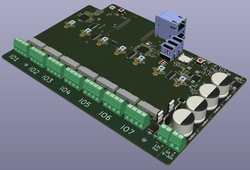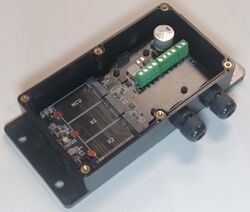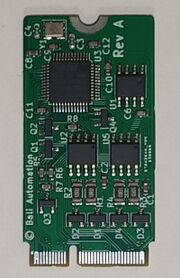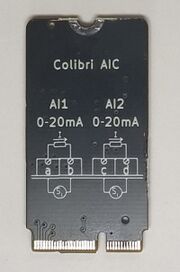Difference between revisions of "Colibri"
| Line 7: | Line 7: | ||
[[Colibri]] is a low-cost automation system, primarily intended for building automation, home automation, energy supervision, agriculture supervision and similar systems. Main features beside costs are; | [[Colibri]] is a low-cost automation system, primarily intended for building automation, home automation, energy supervision, agriculture supervision and similar systems. Main features beside costs are; | ||
| − | * Flexible I/O system, via Expansion Cards in M.2 Key E sockets. | + | * Flexible I/O system, via Expansion Cards in M.2 Key E sockets. Many types already developed. |
* Power supply of 9-36 Volt, either AC or DC (some expansion cards won't work with DC supply) | * Power supply of 9-36 Volt, either AC or DC (some expansion cards won't work with DC supply) | ||
| − | * Colibri- | + | |
| − | * Colibri- | + | == Carrier Boards == |
| + | * Colibri-3 using LoraWAN for communications and 2 I/O expansion slots. | ||
| + | * Planned; Colibri-8 is like the Colibri-3, but with 7 I/O expansion slots. | ||
| + | * Planned; Colibri-7pi is a full-fledged Raspberry Pi, built with Compute Module 4 (CM4) and 7 I/O expansion slots. | ||
== MCU Modules == | == MCU Modules == | ||
| Line 132: | Line 135: | ||
|- | |- | ||
| | | | ||
| − | | [[Colibri- | + | | [[Colibri-8]] |
| Colibri Carrier | | Colibri Carrier | ||
| Colibri carrier board with 7 expansion cards, similar to [[Colibri-3]] but with a different size and enclosure. | | Colibri carrier board with 7 expansion cards, similar to [[Colibri-3]] but with a different size and enclosure. | ||
Revision as of 12:35, 20 July 2023
Colibri is a low-cost automation system, primarily intended for building automation, home automation, energy supervision, agriculture supervision and similar systems. Main features beside costs are;
- Flexible I/O system, via Expansion Cards in M.2 Key E sockets. Many types already developed.
- Power supply of 9-36 Volt, either AC or DC (some expansion cards won't work with DC supply)
Carrier Boards
- Colibri-3 using LoraWAN for communications and 2 I/O expansion slots.
- Planned; Colibri-8 is like the Colibri-3, but with 7 I/O expansion slots.
- Planned; Colibri-7pi is a full-fledged Raspberry Pi, built with Compute Module 4 (CM4) and 7 I/O expansion slots.
MCU Modules
There is a choice, and more will follow;
- Colibri MCU1 - RAK3172 which has a STM32WLE5, 256kB Flash, 64kB RAM, on-chip LoRa and LoraWAN protocol available from GitHUb.
- Colibri MCU2 - ESP32-S3-Mini-1-N4R2 which is intended for ESPhome applications. On-board PCB WiFi antenna.
- Colibri MCU3 - ESP32-S3-Mini-1-N8 which is intended for ESPhome applications. IPEX/U.FL antenna connector.
Expansion Modules
The Colibri system is based around the M.2 connector and a non-standard bus for I2C and SPI communications. Each expansion board has a EEPROM memory available to identify which module is present in each expansion slot. Furthermore, there is a Colibri Forth program located in the eeprom that contains the functionality of the module, executed in the MCU module. This allows for future expansion modules without requiring the upgrade of the MCU module.
NOTE; Colibri Forth is only available/supported for the Colibri MCU1 at the moment. Porting to other MCUs might or might not happen in the future.
Form Factor
Colibri expansion boards are 22x42mm and has an edge connector called M.2 Key E. Many of the pins are following the Key E standard, but Colibri boards have additional requirements, which is not available in the official standard.
WARNING!!! Do NOT plug Colibri expansion boards into other equipment. Do NOT plug any M.2 card into a Colibri system, unless that card/board is specifically made for Colibri.
Boards
| Name | Type | Description | Status |
|---|---|---|---|
| Colibri-3 | Colibri Carrier | Minimal Colibri Host with 2 expansion cards. MCU slot is to be populated with any of the MCU variants available. | Prototype available |
| M2 E Breakout | M2 breakout board | Generic breakout board for M.2 E key boards. | Available for pre-orders |
| Colibri Dev | I/O Expansion | Development, maker, experimentation and breakout board for the Colibri I/O system. Power rails, 24LCxx dedicated footprint, plus i2c and spi on large pads. | Available for pre-orders |
| Colibri AIC | I/O Expansion | Two analog 0-20mA inputs | Prototype available |
| Colibri AIV | I/O Expansion | Two analog 0-10V inputs | Prototype available |
| Colibri AQV | I/O Expansion | Two analog 0-10V outputs | Prototype available |
| Colibri DIU | I/O Expansion | Four digital inputs, for state, counter, pulsewidth measurement. On-board STM32F030 for ability to count very fast pulses and high accuracy PWM measurements. | Prototype available |
| Colibri RS485U | I/O Expansion | Two non-isolated RS-485 ports. On-board STM32F030 implementing Modbus protocol, either as master or slave device. | Prototype available |
| Colibri PID1 | I/O Expansion | PID regulator, with a PT1000 input and a 0-10V analog output. On-board STM32F030 for host-independent operation. | Prototype available |
| Colibri Pt1000 | I/O Expansion | Two PT1000 temperature sensor inputs. | Prototype available |
| Colibri SSR | I/O Expansion | Two Solid State Relays, ON/OFF. | Prototype available |
| Colibri TRIAC1 | I/O Expansion | Four Triac outputs, driving 24V AC. | Prototype available |
| Colibri MCU1 | Host MCU | MCU module for the Colibri-3 and similar carrier boards with LoraWAN. Contains RAK3172 with 256kB Flash and 64kB RAM. | Prototype ordered from manufacturer. |
| Colibri MCU2 | Host MCU | MCU module for the Colibri-3 and similar carrier boards with LoraWAN. Contains ESP32-S3-Mini1-N4R2. | Prototype ordered from manufacturer. |
| Colibri MCU3 | Host MCU | MCU module for the Colibri-3 and similar carrier boards with WiFi. Contains ESP32-S3-Mini1U-N8. | Prototype ordered from manufacturer. |
Planned Boards
| Name | Type | Description | Status | |
|---|---|---|---|---|
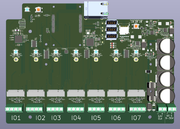
|
Colibri-7pi | Colibri Carrier | Colibri carrier board with 7 expansion cards, two Ethernet ports, 4 USB ports and SDcard connector. Powered by Raspberry Pi CM4 module. | Ready for prototype |
| Colibri-8 | Colibri Carrier | Colibri carrier board with 7 expansion cards, similar to Colibri-3 but with a different size and enclosure. | Planned |
License
All Schematics and PCB layout are licensed with the GPLv3, meaning that you are free to make your own designs or manufacture devices using these. We expect that if you derive new design, that you publish these, preferably on this website.
The software will also be published with GPLv3, when something is workable.
